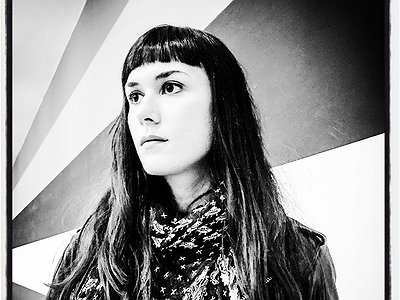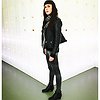Part 2.
The relationship between music and other forms of art – painting, video art and cinema most importantly - has become increasingly important. How do you see this relationship yourself and in how far, do you feel, does music relate to other senses than hearing alone?
People often use the word "cinematic" when talking about my music and I've had several people describe seeing images in their mind while listening to my music or watching me play live. I think it's natural for one sense to activate another. I feel that we all experience synaesthesia on some level.
There seem to be two fundamental tendencies in music today: On the one hand, a move towards complete virtualisation, where tracks and albums are merely released as digital files. And, on the other, an even closer union between music, artwork, packaging and physical presentation. Where do you stand between these poles?
My practical side leans towards digital release and distribution because it's such a direct way to connect with a vast audience and also a very efficient way of making money thanks to sites like Bandcamp. However, the music lover in me will always prefer to release my music with beautiful packing on vinyl, cd, or cassette. I love reading and am constantly buying new books, but recently I received a Kindle as a gift and discovered that it's much more practical to bring the Kindle with me on tour instead of a stack of books. So now it's a balance between indulging my romantic side that loves and appreciates the object and my pragmatic side that values efficiency.
The role of an artist is always subject to change. What's your view on the (e.g. political/social/creative) tasks of artists today and how do you try to meet these goals in your work?
I'm seeing many artist friends use their work as a means to promote a cause that's dear to them. I recently bought a very limited edition LP by my friend Bishop & Clerk that benefitted the preservation of African Rhinos. My friend Eric Quach released a trio album with his group Parallel Lines that is benefitting Polar Bears International.
Music-sharing sites and -blogs as well as a flood of releases in general are presenting both listeners and artists with challenging questions. What's your view on the value of music today? In what way does the abundance of music change our perception of it?
I think it's a wonderful time in history for the listener, having so many resources online to learn about new music. Of course the sheer abundance of music that's available online means that there's increased pressure on the artist to constantly create and release new music to remain relevant and in the media. Everyone knows how hard it is to eek out a living as a musician but I personally feel that the new opportunities that arise out of this new ability to discover and hear music from artists all over the world outweighs the negative impact that the same accessibility has had on the record industry and on record sales.
How, would you say, could non-mainstream forms of music reach wider audiences?
I think that Bandcamp is the greatest website for underground musicians at the moment. Anyone can find and stream your music through their site and the artists actually get paid for their music if the listeners buy the digital downloads.
Usually, it is considered that it is the job of the artist to win over an audience. But listening is also an active, rather than just a passive process. How do you see the role of the listener in the musical communication process?
I very much feel that the listener can change the perception of a composition especially in the live environment. Music takes on different meaning with an audience
Reaching audiences usually involves reaching out to the press and possibly working with a PR company. What's your perspective on the promo system? In which way do music journalism and PR companies change the way music is perceived by the public?
I've done a lot of self-promotion in the past when I've released my music on my own label, Saffron Records, and it's amazing how I've developed friendships with a lot of the music journalists that I initially contacted for press. This whole process is about connecting with people and I think it's great when the artist can interface one-on-one with the media and develop a personal bond instead of merely promoting a product.






